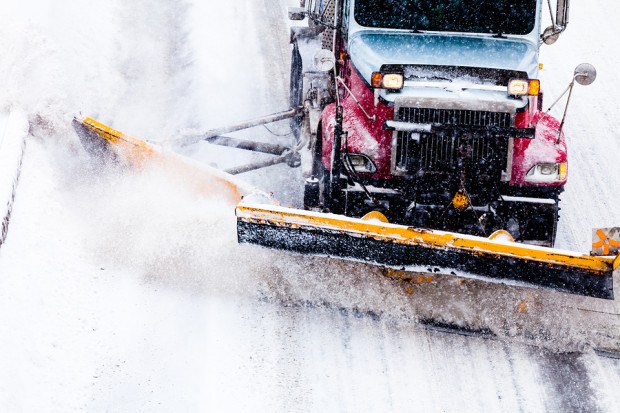Boston has had more snow this year than Fairbanks, Alaska, which is 23.3 inches below normal for this time of year at 29.7. It outstrips Fargo, North Dakota, with 15 inches.
Although, things could be worse. Marquette, Michigan, had received 149.9 inches as of Monday.
That’s cold comfort for Boston. Enough snow had fallen in the 24 days through Monday to make it the third-snowiest season on record. The city was forecast to pick up another inch or so on Tuesday.
From Jan. 24 to Feb. 16, 90.2 inches (2.29 meters) of snow were recorded at Boston Logan International Airport, according to the National Weather Service. That’s behind the all-time snowiest entire winters, 1995-1996 with 107.6 inches and 1993-1994 with 96.3.
“I have over 41 years of government service dealing with the weather in one form or another; I can’t remember the snow pack being this deep over southern New England,” said Alan Dunham, who was in the Air Force before becoming a weather service meteorologist in Taunton, Massachusetts. “It is pretty darn amazing.”
This season through Monday, Boston had received 95.7 inches of snow, 3.26 times more than usual, according to the weather service. If the latest storm drops an inch, then Boston will be having its second-snowiest winter.
Taking Toll
The snows of Boston have taken a toll on spirits and commerce. Schools have closed, flights have been canceled and the region’s Massachusetts Bay Transportation Authority has faced service cutbacks or suspensions.
On Tuesday, after more snow over the weekend, the authority was still operating on a limited schedule and canceled some commuter rail service as well some rapid transit. The MBTA is using crews to hand-shovel tracks on its Redline surface routes in Braintree and the Mattapan section of Boston, according to a statement.
The actual cost to the area will be difficult to measure because much of the region’s economy is rooted in intellectual businesses, so people can simply work at home, said Frank Conte, a director at Suffolk University’s Beacon Hill Institute in Boston.
A single day’s worth of gross domestic product for Massachusetts is about $1.2 billion, although Conte said he doesn’t think actual losses are close to that.
Through Monday, Boston is almost on par with Buffalo, New York, where 96.3 inches have fallen since Jan. 24.
Snow Comparisons
The Buffalo number is a little deceiving, because the airport, where the official reading is taken, missed last November’s massive lake effect storms that dropped as much as 88 inches in Wyoming County, New York, in just a week, said Steve Welch, a national weather service meteorologist in Cheektowaga, New York.
Bostonians looking out the window won’t see 90 inches or more of snow on the lawn. It isn’t because any melted — it’s too cold for that. Instead, snow settles after it hits the ground, Dunham said.
“These past few storms have been fairly light and fluffy,” Dunham said. “Just the weight of itself it settles it.”
More Forecast
Dunham said there is a chance for more snow on Thursday and again this weekend. It’s still too early to say how much.
The snow train may keep on coming unless there is a major shift in weather patterns. So far, there is no indication of that.
If either or both of those storms brings another foot of snow, Boston will have its snowiest winter on records going back to the 19th century. If it gets another 17.4 inches, it will set that record in just the past month alone.
That might drive people in Boston a little “crazy,” Dunham said.
In addition to the snow, Boston has had 22 consecutive days where the daily average temperature has been below normal, he said. The cold isn’t going anywhere either.
“We’re not done yet, we just crossed the middle of February,” Dunham said.





















 State Farm Mutual to Pay $5B Dividend to Auto Insurance Customers
State Farm Mutual to Pay $5B Dividend to Auto Insurance Customers  Reinsurance Program Could Wipe Out Need for Calif. FAIR Plan: Legal Exec
Reinsurance Program Could Wipe Out Need for Calif. FAIR Plan: Legal Exec  Viewpoint: Runoff Specialists Have Evolved Into Key Strategic Partners for Insurers
Viewpoint: Runoff Specialists Have Evolved Into Key Strategic Partners for Insurers  Telematics and Trust: How Usage-Based Insurance Is Transforming Auto Coverage
Telematics and Trust: How Usage-Based Insurance Is Transforming Auto Coverage 








